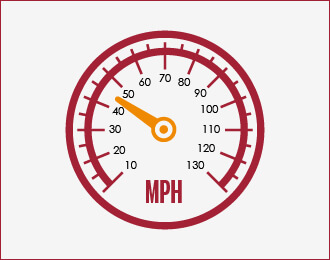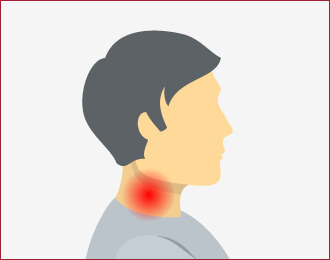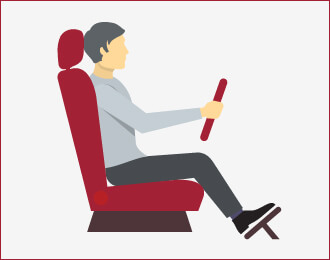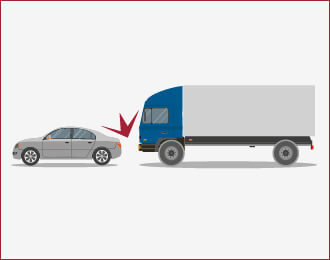What are the most common injuries after a car accident?
Neck and shoulder injuries, often accompanied by neck pain, are among the most common injuries suffered in car accidents. One particular injury that has become synonymous with car accidents is what's commonly known as whiplash.
However, strictly speaking, despite what most people think and the type of language often used in the press and on television, whiplash is not an injury.
What is Whiplash?
Whiplash refers to a range of neck injuries caused when the head is thrown violently backwards and forwards (known in the medical world as hyperextension and hyperflexion). This most commonly happens if you are involved in a car accident, such as a rear-end shunt, a side impact, or another type of collision between vehicles.
When you think about a whipping motion, the term makes perfect sense, as the neck mimics the same movement as the lash (the flexible part) of a whip.
The phrase "whiplash" is an umbrella term for the types of neck injuries that are caused by this sudden motion. The proper name for the mechanism of the injury is "cervical acceleration-deceleration," and the lasting symptoms are referred to as whiplash-associated disorders (WADs).
WADs are the result of the damage to the intervertebral discs, facet joints, ligaments, and other structures of the neck that this forceful movement causes.
What Factors Affect Whiplash Severity?
One factor affecting the chance of suffering from a whiplash injury is the speed at which the car crash takes place. If the crash happens when the vehicles are travelling at a low speed, then the chances are that the whiplash injury will not be as severe as if the car was travelling fast on a motorway. However, even collisions occurring at speeds as low as 5 mph can result in whiplash injury and Whiplash Associated Disorders (WADs), while higher-speed collisions do not necessarily lead to whiplash.
Furthermore, if a passenger suffers from a pre-existing neck injury, then there is a greater chance they will suffer a whiplash injury in a car crash than other passengers involved in the same incident; pre-existing weakness in the cervical spine (the neck) is a significant factor influencing whether a person is likely to suffer a whiplash injury.
Bad in-vehicle posture is another reliable indicator of a person's susceptibility to whiplash in a car accident. This means that, compared to a fellow passenger with good posture, a passenger who has poor posture at the time of impact may suffer more serious injury. Therefore, it is not unusual for different passengers in the same car to experience different levels of pain and degrees of injury after a car crash. As such, they may have vastly different recovery times for their respective whiplash injuries.
What Are the Symptoms of a Whiplash Injury?
- It can be very difficult to identify whiplash injuries, as they will not always appear on an X-ray.
- Weakness of the muscles supporting the neck, which is what causes pain, is very difficult to detect with tests.
- Therefore, scans and tests will only be carried out if a medical professional suspects a broken bone.
However, the pain is very real for the victim and, what's more, the whiplash symptoms may not be immediately apparent. It can take several hours or days for symptoms to develop fully after the initial injury.
How Long Does Whiplash Last? Recovery Timelines Explained
According to the NHS, some people's condition will improve in a matter of just a few weeks or months, but whiplash can last over a year. It is therefore crucial that anyone who thinks they may be experiencing whiplash symptoms seeks medical treatment.
Some cases improve on their own, but doctors may prescribe painkillers or refer the patient to a physiotherapist for treatment.
Here are a few whiplash injury facts that are not always known by the public.
- Whiplash does not occur only in high-speed collisions. In fact, someone in a car travelling as slow as 5mph could sustain a whiplash injury in a low-speed collision.
- Although whiplash is commonly linked to road traffic accidents, there are many other incidents that can cause it. It can be the result of a slip, fall, or sudden blow to the head or body while playing sports such as rugby, football, or boxing.
- According to the NHS, some people's condition will improve in a matter of just a few weeks or months, but whiplash can last over a year. It is therefore crucial that anyone who thinks they may be experiencing whiplash symptoms seeks medical treatment.
When Does Whiplash Become a Long-Term Problem?
Some injuries to the neck can be severe, possibly having a long-term debilitating effect on the sufferer.
A very small percentage of people suffering from whiplash-related injuries have problems with memory, depression, or sleep loss. Some people also suffer from late whiplash syndrome, which is where the symptoms of the whiplash injury are felt for more than six months after the accident occurred.
In a high-speed car crash, the impact is more severe, and the whiplash injuries sustained can therefore be more severe. This could include:
- Damage to the vertebrae, which can become fractured. If this happens, it can result in spinal cord injury and paralysis.
- Damage to spinal discs, which can also cause spinal cord damage and require surgery.
What Causes Whiplash? Not Just Car Accidents
It is a common misconception that passengers who are travelling in the same car and are involved in a road traffic accident will suffer the same type of whiplash injury. One of the passengers may be injured significantly and be in a lot of pain for months whereas another may recover within only a few weeks.
This is because there are a complex array of factors at play, ranging from the height, weight and health of the individual passengers to their location in the car relative to the points of impact with another vehicle or road furniture etc.
How Does Speed Affect Whiplash?

One factor affecting the chance of suffering from a whiplash injury is the speed at which the car crash takes place. If the crash happens when the vehicles are travelling at a low speed then the chances are that the whiplash injury will not be as severe as if the car was travelling fast on a motorway.
However, even collisions occurring at speeds as low as 5mph can result in whiplash injury and Whiplash Associated Disorders (WADs) while higher speed collisions do not necessarily lead to whiplash.
How Do Previous Neck Problems Contribute to Whiplash?

Furthermore, if a passenger suffers from a pre-existing neck-injury then there is a greater chance they will suffer whiplash injury in a car crash than other passengers involved in the same incident; pre-existing weakness in the cervical spine (the neck) is a significant factor influencing whether a person is likely to suffer whiplash injury.
How Does Driving Position Influence Whiplash?

Bad in-vehicle posture is another reliable indicator in a person's susceptibility to whiplash in a car accident. This means that, compared to a fellow passenger with good posture, a passenger who has poor posture at the time of impact may suffer more serious injury. Therefore it is not unusual for different passengers in the same car to experience different levels of pain and degrees of injury after a car crash. As such, they may have vastly different recovery times for their respective whiplash injuries.
How Do Directional Forces Impact Whiplash?

The direction of impact, whether you’re involved in a rear shunt accident, a head-on collision, or side collision, will have an effect on the type and severity of your injuries.
How Does Headrest Position Influence Whiplash?

An improperly adjusted headrest can significantly increase the chances of suffering a severe whiplash injury. This is why it’s important to ensure that your headrest is set at the right height and your seat is at an appropriate angle.
How Do Accelerating Forces Play a Role in Whiplash?

If the striking vehicle is larger than the vehicle being struck, a lot of force will be transferred to the smaller vehicle. This is likely to cause more severe injury. But even if the cars are the same size and travelling at slow speeds – say, 8 miles per hour – a collision can still produce a 5-G accelerating force of the driver's head.
Can You Get Whiplash in Low-Speed Collisions?
A commonly held myth is that you cannot suffer an injury to your neck if you are involved in a collision at low speed.
It is often said that these low velocity collisions cannot cause injury. However, every day in the UK hundreds of people sustain genuine injuries as a result of low velocity impacts, with many of these resulting in long-term damage to the cervical spine (the neck).
What are the statistics for whiplash in the UK?
It remains an unfortunate fact that the motor vehicle industry is yet to fully tackle the problem of whiplash prevention. This is clearly illustrated by the following statistics from the Association of British Insurers:
- 1,500 whiplash claims are made in the UK every day
- Whiplash claims cost insurers around £2 billion every year
- Modern cars are designed with crumple zones. In higher velocity impacts, the car crumples; the crumple zone acting as a cushion and absorbing much of the force of the crash so that it is not transferred to the occupants or, at least, is significantly reduced. Crumple zones are located at the front and rear many vehicles.
- However, as anyone who has been involved in a low velocity impact will know, when the forces involved in a collision are minor, the cars crumple zone does not activate and all of the force of the collision is borne by the people inside the car – and the cervical spine, situated just beneath the head, typically bears more of this force than any other part of the body.
- Of course, drivers and passengers involved in higher speed collisions are likely to sustain other serious injuries such as crush injuries and broken bones, but the activated crumple zone is there to hopefully take the brunt of the force. This is why the belief that whiplash injuries can't be sustained in low-speed collisions (which includes collisions where the vehicles are travelling as slow as 5mph) is false. As such, it is an accepted paradox that the forces experienced by and applied to people inside cars can be worse in lower velocity impacts than in higher velocity collisions. And although whiplash injuries are sometimes portrayed by the tabloid media as minor and unimportant, their symptoms can last for weeks, months, years or even prove to be permanent.
The message from all of this is clear, your health is far too serious to take any risks or to try and diagnose your difficulties yourself. If you are involved in a collision you should see a doctor.
What Is the Role of Headrests in Preventing Whiplash?
It is sometimes said that if your car has a headrest then you cannot suffer a whiplash injury.
While there is some truth in the statement that a correctly positioned headrest can reduce the possibility or severity of a whiplash injury, you need only ask the hundreds of thousands of motorists who, each year, suffer neck injuries who, despite having positioned their headrest in accordance with safety instructions, discover that is by no means a guarantee of staying injury-free.
A headrest is effective in preventing the neck from hyper-extending (moving to its extreme backwards position) but has no capability to stop the neck from hyperflexing (moving to its extreme forward position). This latter motion alone can cause neck injuries and commonly does.
What Is the Correct Headrest Position?
Although it won't eliminate the risk of whiplash, adjusting your headrest in the right way can lessen the extent of injury, so whenever you get into a vehicle, whether as a driver or passenger, you should make sure the headrest is in the correct position.
According to the Royal Society for the Prevention of Accidents (ROSPA) head restraints should be positioned in the following way:
- Ensure that the top of the head restraint is as high as the top of your head
- Position the head restraint as close to the rear of your head as possible (the angle of the seat should be more or less upright to allow this to easily happen).
By reducing the distance between the back of the head and the head restraint (first example), the neck is protected from bending back in an impact. This also minimises the time it takes for the head to come into contact with the restraint. The head is supported for longer during an incident.
In the second example above, the space between head and headrest means that the head will move further back in a collision, increasing the chances of the occupant sustaining a severe whiplash injury.
The top of the head restraint must be aligned with the top of the person's head, (first example above) offering full support and minimising the risk of a severe whiplash injury.
In the second example above, the head is not in alignment with the headrest, and will not be fully supported in the event of an accident. The chances of an injury are increased.
ROSPA also notes the importance of having a locking headrest – in other words, one that won't move during impact. If the headrest is going to move as your head is thrown back, this is not going to offer very effective protection against a whiplash injury.
What Medical Advice Should You Follow After a Car Accident?
It is possible to be involved in a road traffic accident, including a rear-end shunt, without suffering any injury at all. Simply because you are involved in a car crash does not mean that you will definitely suffer injury; some people are lucky and walk away from a collision without any lasting pain or discomfort.
You should, however, get yourself looked over by a medical professional following any car accident and remember that the symptoms are not always immediately apparent.
Why Should You Talk to Thompsons' Whiplash Compensation Specialists?
If you have been involved in a car crash and think you may have suffered whiplash injuries, you should speak to your GP for advice.

David Adams
David Adams
"The compensation levels and values are all determined by the extent of the injury."
If you have been involved in a car crash, even if you are unsure whether you would be able to make a compensation claim, contact our No Win No Fee lawyers today on 0800 0891 331. We will investigate matters for you and advise you on your first step towards receiving the compensation you deserve.



